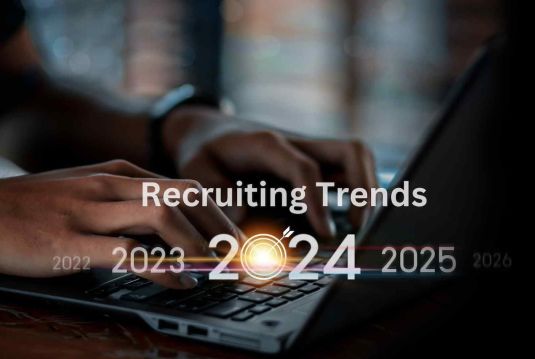Affinity Bias
Part 1 of the Coopers Blog Series on Unconscious Biases

With today's post, we start a blog series on unconscious biases. These are unconscious cognitive distortions, such as social stereotypes and prejudices. Based on appearance, language, origin, and so on we make snap judgements and quickly categorize people into social groups. The problem is that we no longer judge the individual itself, but the entire group to which we have assigned them. The result: misjudgments, bad decisions, and discrimination.
"It is easier to split an atomic nucleus than a prejudice." – Albert Einstein
In recruiting, we are faced with decisions about people we don't really know on a daily basis. Especially in such situations of incomplete information, the human brain is prone to making unconscious mistakes. It takes mental shortcuts that often fall too short and fail to accurately represent reality. Tall people, for example, have a career advantage: they are more likely to end up in leadership positions and earn more, per inch above average around $789 annually.
Unfortunately, and despite better intentions, we keep falling into these traps. Researchers concluded that we all hold biases, even when we firmly believe that prejudice and discrimination are wrong. Therefore, it is called unconscious bias. However, with the following tricks, it is possible to recognize and avoid unconscious biases pitfalls.
How to avoid unconscious biases
Unconscious biases are usually based on insufficient and/or incorrect information. This is also true in the workplace. Unconscious biases influence who is hired, who gets promoted and who is excluded. Surely, this is a motivational killer and can undermine the entire organizational culture. Companies should proactively address the issue of unconscious biases in order to ensure equity, diversity and inclusion in the workplace – especially with diversity becoming an increasingly important criterion when choosing an employer. The good news: According to Daniel Kahnemann, a luminary of behavioral economics, organizations are better able to avoid bias-related errors than individuals because they are naturally slower thinkers and more capable of enforcing orderly processes. So here is what you can do:
1) Raise awareness
Raising awareness of the issue among your workforce is key. Workshops, trainings et cetera are a possible format to generate attention for unconscious biases. Create an open atmosphere in which every employee is heard. Emphasize that no one is a bad person because they have prejudices, rather, it simply makes them human because we all have them. Encouraging your people to question their decisions more often and getting them out of their comfort zone can already reduce biases.
More tips on how training should (and should not) be structured can be found here.
2) Specify unconscious biases
There are many different unconscious biases. Don't discuss them in general, rather address the specific biases. Consider which biases are likely to occur in which situations of your daily work life.
Tip: With our blog series, you will gradually learn about the different biases that exist.
3) Create standardized structures
Create orderly processes! Standardized specifications serve as a guide and leave less room for mental errors. For example, create structures for decision-making processes, for evaluating resumes and candidates, set up standardized interview procedures so that all candidates go through the same process, et cetera.
4) Anonymous employee surveys
Anonymous employee surveys provide insight into how employees feel about participation, equal opportunity, and diversity within the company.
Absolute recommendation: Google has published its unconscious bias workshop, which provides many practice-based examples, insights and is extremely helpful.
Coopers Blog Series: Unconscious biases
For us at Coopers, diversity plays an important role. As this topic is close to our hearts, we would like to contribute to reducing unconscious biases in the working world with this blog series. From time to time, we will present unconscious biases relevant in the work environment. Let's get started:
Unconscious bias #1: Affinity bias
Birds of a feather flock together! Due to the affinity bias, we are unconsciously attracted to people who share our beliefs, interests and background.
In the work environment, this leads to situations in which hiring decisions are based not on skills, but on affinity. It's not the most qualified candidate who gets a job offer, but the one to whom the hiring manager feels a connection – for example, because they went to the same university, come from the same area, or root for the same soccer club. This makes it feel like a "good fit," when objectively speaking, this is not necessarily the case.
Similarly, affinity bias is evident in promotions. Managers tend to promote employees in whom they can see themselves. This puts those who are different but no less talented at a disadvantage ¬- especially women, since the majority of managers are still male.
In innovation management, the affinity bias can act like blinders. It tempts managers to rely on ideas from trusted employees rather than on input from other team members who they cannot relate to personally. Yet, fresh perspectives should be valued, especially when generating new ideas, because they encourage to think outside the box.
How to reduce affinity bias: Career decisions, such as those regarding hiring and promotions, should be based on purely objective, measurable KPIs. The standardized approach ignores personal relationships and gives everyone the same opportunities. A group of decision makers instead of individuals also helps.
By the way, affinity bias is not a managerial problem; it affects us all. It starts with the decision of who we ask for a lunch date. Be brave and dare to meet colleagues you don't usually interact with much. This can lead to valuable relationships.
Do you catch yourself falling into the affinity bias trap? We'd love to hear your eyperiences and how you deal with it. Either via email or on our social media channels Facebook, LinkedIn, Xing and Instagram.
Your Coopers Team
Career

The Value of Experience and Expertise in Recruiting
Coopers is your recruiting partner: Benefit from our experience and expertise ranging from job search to contract negotiation.

Top 7 Recruiting Trends
Top 7 Recruiting Trends – from automation top data-driven recruiting.

Coopers Bern
Recruitment in Bern: We support you with recruitment, contracting, executive search, project recruiting and more.
